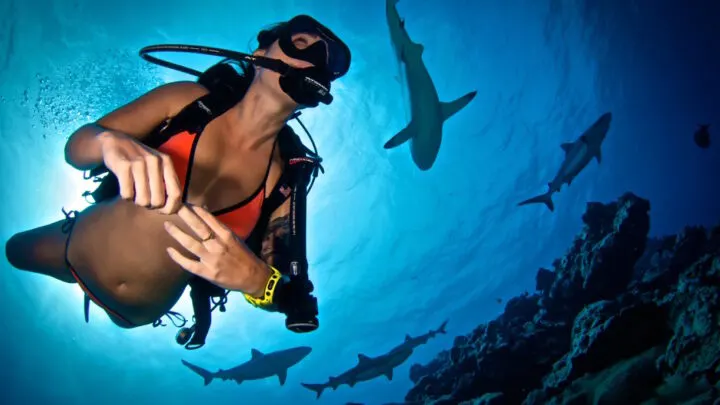Diving is about having fun! We are all just happy to be in the water and excited about learning to dive. We do not often think about the more difficult emotions, like fear. But fear is normal and it is important that we know how to handle it when we dive.
Over the last few weeks, the Girls that Scuba have been talking about their experiences of fear in diving. Sharing these experiences openly with other divers, especially the new divers, has lead to some open discussions about how we handle fear when we dive. We have been reading over some of the conversations and wanted to highlight some of the themes discussed and share some of the advice from the amazing Girls that Scuba. Author Laura Walton explains more
Fear is normal
If anything can be learned from the recent conversations on Girls that Scuba it is this: fear is normal. In fact, it is part of the experience of diving.
“You are going into an unknown environment on life support,… if you weren’t putting some extra thought into this then I’d be worried … I have 500+ ocean dives and still get a bit of the butterflies”
All divers, even the experienced professionals encounter fear and nerves:
“I still get nervous when doing something new”
“We all have moments where we feel unsure, no matter how long we’ve been diving”
“I’ve got 200 dives and still have moments where I have to gather myself”
But fear and excitement are two sides of the same coin. In terms of how they feel in our bodies, they are pretty much the same thing. The difference is in how we interpret the feelings.
“I’m always excited/nervous because it’s a wonderful but dangerous activity”
There are many fears in scuba diving
If something is frightening you, the most important thing to know is that you are not the only diver to have experienced this. GTS have been sharing there fears of all sorts of aspects of diving. This is a short list, but there are lots more.
Power of water /Vastness of the ocean
Not being able to breath
Getting water up the nose
Not being able to communicate
Failure and embarrassment
Mask clearing skills!
Dangerous marine life
Depth / “heights”
Being alone
Although there are common themes, fear is very personal and it is possible to hold a fear of something very specific, which may not be shared by the other divers around us.
“I was terrified of damselfish, and although they never got close enough to attack, the fear was real! After learning more about damsels and their propensity for charging if I got too close, I simply kept my distance and reduced my overall fear” – Nicole Helgason, reefdivers.io
Let’s talk about other divers
We are usually diving with other people and this can influence our fear and how we deal with it. We are also often diving in a system where we need to be ready for the dive at the specified time and keeping up with the group. In some ways this can be helpful in managing fear:
“ being rushed .. can sometimes be the best thing! … no time to let nerves even get a remote grip in the wrong way – for example lining up penguin SAS style with 20 blokes on the dive deck … and jumping off to catch the current at exactly the right point. Buddy checks done and ‘go go GO!!’ Straight in and down but no time to start to be consumed by anxiety – none!”
On the other hand we occasionally encounter individuals or groups that have different attitudes to our own. Unfortunately several of the GTS have had bad experiences with other divers. For example: being criticised by others on the boat, being hassled and rushed into the water or pushed to do something beyond their training or ability. Sadly this occasionally includes diving professionals.
Sometimes we also encounter cultures where hiding fear or inadequacies is the norm. This can be difficult if we are frightened or anxious because these social environments are lacking in support and can aggravate fear and sometimes promote poor practices in diving.
In these situations we can become subject to peer pressures which lead us to conform to the group. Depending on our individual style and experiences, this may mean hiding fear and not asking for important safety information, not speaking up when we are not comfortable or going along with a group decision even if we believe it to be incorrect.
Fear and safety
To dive, we enter an extreme environment, wearing specialist equipment and applying a set of skills that are all essential for our survival. There are inherent dangers within this environment, not least our own and other people’s behaviours. Fear is a useful emotion as it signals potential risks and helps us to gauge our level of comfort with a situation. Ignoring or dismissing fear can have a negative impact on safety, ours and the safety of other divers.
“Diving is dangerous, having the wrong mindset or not being in your groove can have serious consequences”
“Diving relies on a culture of safety. A diver should not feel pressured to do a dive unless they feel comfortable and safe with the dive”-Anna Torres
A fearful state of mind can predispose panic, so we need to know how to respond effectively to this emotion. Sometimes this will mean choosing not to dive on a particular day and we have to be okay with that.
Overcoming fear
As divers we need to learn to do something with fear. Fears that run away from us can lead to panic in the water and panic is the real danger here. In order to be safe in diving, we need to learn how to respond to our own fear. Not only does this allow us to be better divers, it can also be a huge achievement and, for some people, its life-changing.
“The more dives you make, the more experienced you become – you just start trusting yourself, understanding that all the actions underwater become just automatic and very natural”
“Each time you get past the fear it will diminish and before you know it, it turns into experience and confidence!”
Making some room for fear can be important in overcoming it:
“Experience is the only way and sometimes it just happens so quickly you have no choice but to NOT let fear in when you are rushed or stuck or hit a problem. There is often no option! … And then when you realise you coped you can deal with so much more.”
The GTS Facebook group is filled with stories from women who found ways through their fear and are diving all over the world. Many of them are now professional divers … they may even be your instructor! If we can do it, so can you!
“Before I learnt to dive 4 years ago, I was too scared to go into open water any deeper than my knees.. the challenges of relearning how to relax and breathe in & under water have however made me much stronger & empowered in other areas of my life,.. because yes if I can do this diving, I can do anything!”
You’ve got this! Use these tips and try again. We are here to help!

About the Author
Laura is a Scuba Diving Instructor and Clinical Psychologist with a fascination for the psychology of diving. She is also the author of the PADI Psychological Diver course. Learn about how psychology can improve your diving from Laura at Fit to Dive.

